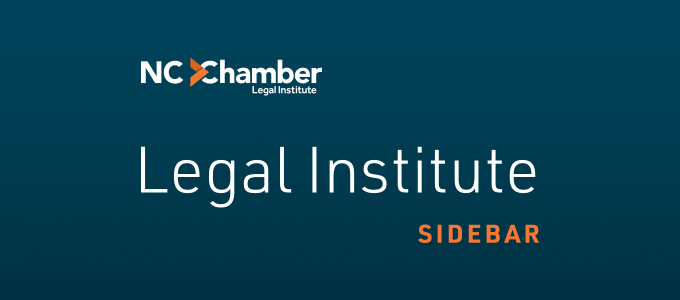Superior Court Decision Upholds COVID-19 Liability Protections in NC

*The following update was originally shared on Feb. 22, 2021, with readers of the NC Chamber Legal Institute Sidebar, a monthly publication from NC Chamber Legal Institute President Ray Starling detailing important legal cases impacting job creators in North Carolina.
In a matter of extraordinary importance to North Carolina’s business community involving a case of first impression, by a signed Order dated Feb. 12, 2021, a Superior Court Judge in Durham County dismissed a lawsuit that attempted to challenge the temporary COVID-19 immunity from civil liability provided to our health care heroes in Senate Bill 704. This legislation passed unanimously in the General Assembly on May 2, 2020, and was signed into law by Governor Cooper two days later. Upon signing the legislation, the Governor called Senate Bill 704 “critical” for North Carolina.
Senate Bill 704, along with House Bill 118, which expanded liability protections with its passage a little more than a month later, are two important pieces of legislation that the NC Chamber successfully worked to secure during the 2020 session. A broad coalition of business interests also helped to pass these bills, including representatives from North Carolina’s health care system, as well as numerous independent colleges and universities.
These bills broadly provide immunity from claims of negligence for the contraction of COVID-19 and, in the case of our health care delivery system, also provide immunity for any malpractice claims that may have been caused by the disruptions to the normal provision of care during the COVID-19 emergency. The immunities are temporary, limited generally to the period of the emergency declared by Governor Cooper, are limited to protection against claims for ordinary negligence, and do not provide immunity for grossly negligent conduct or intentional wrongdoing.
Our colleague from the Chamber Legal Institute, Chris Smith of the Smith Anderson law firm, noted during the hearing that the immunity reflects the needed adjustments to our liability system “built for normal times” during these “abnormal times.” He further noted that the immunity reflects the decision by our elected policymakers of how best to keep the “engine of the economy” going while ensuring we “take good care” of each other.
The Durham lawsuit, called Howze, had received state and national media attention as one of the first lawsuits nationwide posing a challenge to limited health care provider immunities like those passed in Senate Bill 704 and House Bill 118. Similar immunities have been enacted around the country. The Durham lawsuit involved a claim for ordinary negligence in a skilled nursing home and asserted that the immunity was not a bar to the lawsuit, but rather an affirmative defense that would need to be proved in each case.
To put this case into context, imagine if the contours of the unanimously enacted immunity legislation were litigated as an “affirmative defense” on a case-by-case basis around the state. The methods by which we manage our economy and our liability system, especially during this world-wide crisis, are matters best decided by our policymakers and not by our courts in individual malpractice lawsuits. The NC Chamber Legal Institute applauds the Superior Court’s ruling, as it reflects this understanding of the need to address these matters through the proper channels.
A consortium of health care providers and entities (physicians, hospitals, and long-term care facilities) unified to help support the defense of the immunity provision. We were excited and encouraged by this cooperative approach. I’ve written before that the business community must collaborate to protect the positive gains we have helped secure for our state’s business and legal climates, which have worked to create so much opportunity across North Carolina.
This goal is, of course, core to the Legal Institute’s mission, and we are focusing harder than ever on raising the resources needed to manage this consistent, constant, cooperative approach. Our Legal Institute Chair, David Sousa, who directed the health care coalition effort, was thrilled with the result in the Howze matter:
“It proves exactly what we are trying to do at the Legal Institute,” David said. “There is strength in numbers. One case, in one courtroom, can have massive impact. We need to closely monitor challenges in the courts to all matters of significant economic impact, and act with the strength, voice, and financial resources of well-funded unity and purpose when needed. We did that here. It worked.”
Alerts previously shared by us and authored by our friends at the Smith Anderson firm on Senate Bill 704 and House Bill 118 can be found here and here.
Sincerely,
Ray Starling
President
NC Chamber Legal Institute